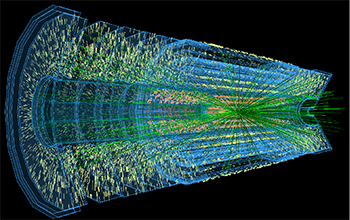
A data visualization from a simulation of collision between two protons that will occur at the High-Luminosity Large Hadron Collider. (ATLAS Experiment © 2018 CERN)
The University of Michigan is part of an NSF-supported 17-university coalition dedicated to creating next-generation computing power to support high-energy physics research. Led by Princeton University, the Institute for Research and Innovation in Software for High Energy Physics (IRIS-HEP) will focus on developing software and expertise to enable a new era of discovery at the Large Hadron Collider (LHC) at CERN in Geneva, Switzerland. Shawn McKee, research scientist in the U-M Department of Physics, is a co-principal investigator of the institute. His work will focus on integrating and extending the Open Science Grid networking activities with similar efforts at the LHC. For more information, see Princeton’s press release, and the NSF’s announcement.
